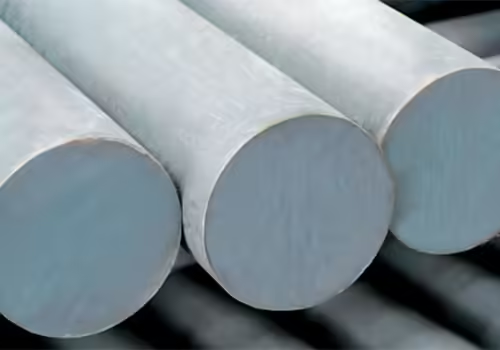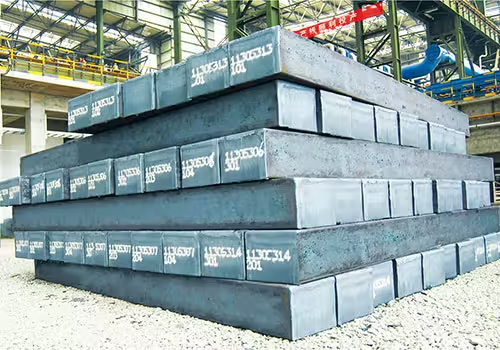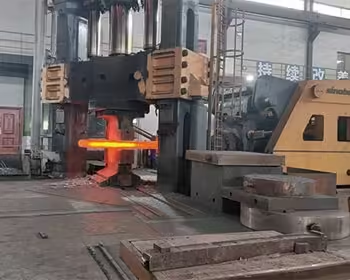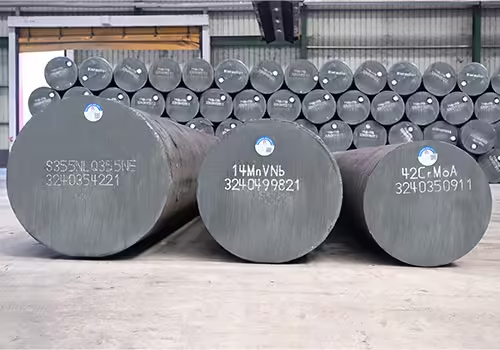
Billet vs Forged Steel: Jiyuan’s Bold Verdict
Table of Contents
Introduction

In the world of metallurgy and manufacturing, the debate of Billet vs Forged Steel has sparked technical discussions, purchasing dilemmas, and production decisions for decades. These two forms of steel materials—though similar in appearance—differ drastically in terms of composition, formation, mechanical properties, and industrial application.
Henan Jiyuan Iron & Steel (Group) Co., Ltd., a giant in China’s steel production landscape, offers a decisive view on this matter. As one of the Top 100 Global Iron and Steel Enterprises and a national high-tech enterprise, Jiyuan brings unmatched credibility and expertise to the table.
This comprehensive blog dives deep into the Billet vs Forged Steel comparison, exploring technical differences, industrial applications, performance characteristics, and most importantly, Jiyuan’s informed verdict. By the end of this article, you’ll understand the critical distinctions and know which option best fits your production needs.
What Is Billet Steel? A Closer Look

Definition and Manufacturing Process
Billet steel is a semi-finished product that is typically cast or continuously cast from molten steel into rectangular or square cross-sections. These billets serve as feedstock for rolling mills, extrusion presses, and forging hammers.
The manufacturing process of billet steel includes:
- Melting: Raw materials are melted in an electric arc furnace.
- Casting: Molten steel is cast into billet molds or continuously cast.
- Cutting and Cooling: The billets are cut to length and cooled before further processing.
Advantages of Billet Steel
Billet steel is widely appreciated for:
- Consistent quality
- Cost-effective mass production
- Versatility in shaping and rolling
- Good mechanical strength for general applications
However, its grain structure tends to be coarser than forged steel, which affects its performance in high-stress applications.
What Is Forged Steel? The Art of High-Pressure Transformation

Definition and Forging Process
Forged steel is created by deforming steel billets or ingots under high pressure, either using open-die or closed-die forging techniques. This compresses the grain structure and removes any internal voids, resulting in improved mechanical integrity.
The forging process typically involves:
- Heating steel to forging temperatures (usually 1100°C–1250°C)
- Hammering or pressing into shape using dies
- Cooling and sometimes heat treating to achieve desired hardness
Advantages of Forged Steel
Forged steel boasts superior mechanical properties, including:
- Enhanced tensile strength and fatigue resistance
- Finer and more uniform grain structure
- Better directional strength (grain flow aligned with shape)
- Lower risk of defects like porosity or inclusions
For these reasons, forged steel is preferred in critical applications such as aerospace components, automotive crankshafts, and pressure vessels.
Billet vs Forged Steel: Key Differences and Performance Metrics
To understand which steel type suits your needs, comparing their properties side by side is essential. Below is a comprehensive comparison table highlighting the distinctions.
Billet vs Forged Steel Comparison Table
| Feature | Billet Steel | Forged Steel |
|---|---|---|
| Manufacturing Method | Continuous or cast solidification | Mechanical deformation under pressure |
| Grain Structure | Coarse and unaligned | Fine, dense, and aligned |
| Tensile Strength | Moderate | High |
| Fatigue Resistance | Average | Excellent |
| Cost Efficiency | More economical for large volumes | More costly due to processing complexity |
| Customization | Limited | High (due to dies and pressure shaping) |
| Defect Tolerance | More prone to internal defects | Minimal due to pressure consolidation |
| Applications | Construction, general machinery, re-rolling | Aerospace, automotive, pressure systems |
| Heat Treatment Response | Good | Excellent |
| Surface Finish | Rough (requires secondary machining) | Smoother due to mold shaping |
This comparison demonstrates the tangible performance and cost trade-offs when considering billet vs forged steel. Depending on your industrial application, one may outweigh the other.
Why Jiyuan Supports Forged Steel for High-Performance Applications

Henan Jiyuan Iron & Steel (Group) Co., Ltd. has decades of experience producing both billet and forged steel. With over 8,000 employees and 3,000 technical experts, the company has developed proprietary processes to enhance the mechanical properties of forged products. Jiyuan’s massive production capacity—supported by dedicated railway connections and advanced metallurgy labs—gives it a unique advantage in mass manufacturing and quality assurance.
Jiyuan’s Commitment to Quality and Innovation
As a national high-tech enterprise, Jiyuan integrates smart production systems with traditional metallurgy. Their forged steel undergoes stringent quality checks at each stage—raw material inspection, forging precision, and final mechanical testing—ensuring conformance to global standards.
Furthermore, as a vice president unit of the Special Steel Enterprises Association of China, Jiyuan promotes industry-wide best practices in forging technology.
Industrial Applications: Billet vs Forged Steel in Action
Different sectors demand different steel properties. Here’s how each steel type is used across key industries:
1. Automotive Industry
- Billet Steel: Used for chassis parts, subframes, and brackets
- Forged Steel: Used for crankshafts, gears, connecting rods, and axles
2. Construction and Infrastructure
- Billet Steel: Commonly rolled into rebar, beams, and angle irons
- Forged Steel: Less frequent, but used in high-load bearing joints
3. Aerospace and Defense
- Billet Steel: Rare due to lower fatigue resistance
- Forged Steel: Essential for turbine shafts, landing gear, and engine components
4. Oil & Gas
- Billet Steel: Applied in pipeline supports and structural members
- Forged Steel: Used in pressure valves, flanges, and safety-critical parts
5. Heavy Machinery
- Billet Steel: Employed in large frame structures and support beams
- Forged Steel: Favored for rotating components, gears, and shafts
Cost Considerations: Choosing Based on Budget and Performance
Price plays a major role in selecting between billet and forged steel. Billet steel generally offers a lower upfront cost due to simpler manufacturing and higher throughput. However, when long-term reliability, wear resistance, or failure prevention is vital, forged steel’s performance can offset its higher cost through reduced downtime and maintenance.
Businesses should evaluate:
- Total lifecycle cost
- Failure tolerance levels
- Environmental conditions (load, pressure, temperature)
- Product customization needs
Jiyuan’s technical team offers consultation services to help clients select the best option based on use-case analysis.
Jiyuan’s Verdict: Billet vs Forged Steel—Which One Reigns Supreme?

So, what’s the final word from Henan Jiyuan Iron & Steel?
Jiyuan’s Bold Verdict
Forged Steel wins in performance. For clients requiring reliability, strength, and fatigue resistance—especially in safety-critical or high-stress applications—Jiyuan recommends forged steel as the clear choice.
However, Billet Steel remains the go-to for cost-effective manufacturing of non-critical parts, especially in the construction and general industrial sectors.
Jiyuan’s capacity to produce both billet and forged products under stringent quality control offers customers the flexibility to match material to performance without compromising on delivery speed or reliability.
Conclusion
The Billet vs Forged Steel debate ultimately comes down to application demands, performance requirements, and cost considerations. Forged steel leads in strength and durability, while billet steel offers affordability and versatility.
Henan Jiyuan Iron & Steel (Group) Co., Ltd. stands as a leading authority in steel production, offering both types with consistent quality and tailored engineering support. With a strategic location, massive workforce, and cutting-edge technology, Jiyuan ensures clients receive the most suitable steel products—whether billet or forged—for their operations.
Choosing the right steel isn’t just a material decision—it’s a strategic one. And with Jiyuan, you’re in capable hands.
FAQ
Q1: Is billet steel weaker than forged steel?
Yes, billet steel generally has a coarser grain structure, making it less resistant to fatigue and stress. Forged steel, due to its refined grain alignment, exhibits higher mechanical strength.
Q2: Can billet steel be used in automotive applications?
Yes, but mainly in non-critical components. For parts exposed to high loads or stress (like crankshafts or gears), forged steel is recommended.
Q3: Is forged steel more expensive than billet steel?
Generally, yes. The forging process is more labor and equipment intensive, leading to higher production costs. However, it may save costs in the long run due to fewer failures.
Q4: Does Jiyuan supply both billet and forged steel?
Absolutely. Henan Jiyuan Iron & Steel produces both with high quality standards and provides expert guidance to customers on selecting the appropriate material.
Q5: Which steel type is more sustainable?
Forged steel’s durability often leads to longer product life and less frequent replacements, contributing to sustainability despite higher initial energy use. Billet steel, due to its efficient production, also scores well in bulk applications.






